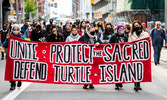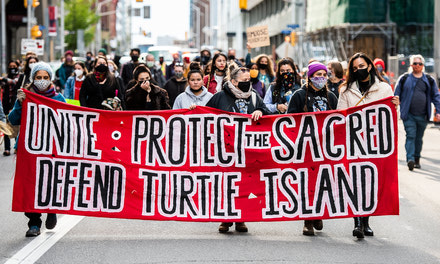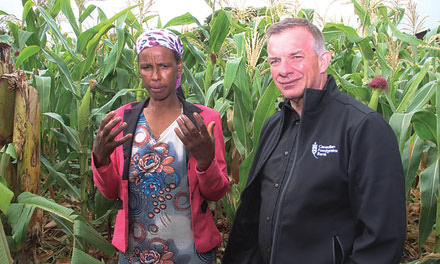By Gary Kenny
“I support Wet’suwet’en strong” – that’s one of the many examples of solidarity slogans brandished on signs carried by non-Indigenous people at Indigenous sites of protest across Canada. Since the publication of the report of the Truth and Reconciliation Commission into Indian Residential schools in 2015, observers say there’s been a surge in settlers eager to ally themselves with Indigenous peoples’ struggles.
Based on anecdotal evidence, more settlers have registered for online courses in Indigenous history and culture, such as the University of Alberta’s “Indigenous Canada.” More have joined protest marches and barricades like the 1492 Land Back blockade at Caledonia, Ontario where residents of the Six Nations of the Grand River opposed a settler development initiative on the disputed Haldimand Tract.
In the name of reconciliation, municipalities, universities, farm organizations and other institutions and groups are increasingly adopting territorial acknowledgments in recognition of Indigenous peoples lands. Many are reaching out to local Indigenous communities in support of their efforts to address urgent social, economic and environmental crises in their midst.
Surely that’s a good thing – more robust settler solidarity support for the struggles of Indigenous people for full recognition of their sovereign rights. But what do settlers in Canada understand about allyship and solidarity with Indigenous peoples to actually mean?
In an essay, “Solidarity as a Settler Move to Innocence,” researchers Miranda Grundy, Jessica Jiang and May Niiya define solidarity broadly as the relationship between groups that share common interests, objectives and responsibilities. Solidarity, they add, signifies that the non-Indigenous ally is informed about and committed to supporting Indigenous struggles.
That sounds like a foundation you can build a house on. But here’s the rub. The definition conceals a paradox. How can settlers engage in genuine solidarity with Indigenous peoples, the writers ask, when their very existence – and their prosperity – is rooted in settler colonialism and the occupation of what were sovereign Indigenous lands; lands that were appropriated through dishonoured treaties or stolen outright?
Vancouver-based writer and activist Harsha Walia puts it more bluntly. Canada is a colonial nation-state, she says. As a country its “state and corporate wealth is largely based on subsidies gained from the theft of Indigenous lands and resources.” Many if not most of the social, economic, cultural and other rights, freedoms and pleasures Canadians enjoy today have their origin and evolution in that unearned advantage, she adds.
It’s a fact that many Canadians seem unaware of, or if they are aware, aren’t comfortable talking about.
Solidarity with Indigenous peoples, to be authentic, needs to be grounded in an understanding of the dynamics of settler colonialism, says Dina Gilio-Whitaker, a member of the Colville Confederated Tribes whose territory spans parts of British Columbia and the states of Washington, Oregon and Idaho. She defines settler colonialism as a distinct form of imperial practice that seeks to eliminate Indigenous populations from their native lands and replace them with an immigrant, non-Indigenous population.
On arrival in Canada, for example, early immigrants from Ireland, Scotland, Germany and other European countries imposed new social, economic and political structures on pre-existing Indigenous populations. Supported by governments of the day, Gilio-Whitaker says, their purpose was to control land and the resources on and beneath the land, and to maintain that control.
Settler colonialism isn’t merely an historic event that occurred in the 18th century. Says Gilio-Whitaker, “it’s state-based and structural,” and its endgame is always the same: the elimination of Indigenous sovereignty in order to possess their land.
“Settler privilege” is the term Indigenous people and their allies apply to the unearned advantages of which Walia, Gilio-Whitaker and others speak. As one Indigenous activist put it, settlers “swim in a sea of settler privilege” and are mostly unaware of it. It blinkers them to the kind of solidarity that best supports the struggles Indigenous peoples identify as priorities.
Phil Henderson has thought deeply about how his privilege as a settler has challenged his understanding about what it means to demonstrate authentic and meaningful solidarity with Indigenous peoples. Raised in Saugeen Anishinaabek territory in Bruce and Grey Counties, what he’s learned is derived from numerous interactions with Indigenous land and water keepers and academic study.
A research fellow at Carleton University’s Institute of Political Economy, Henderson’s academic work has included investigations into alliances between settlers and Indigenous nations in Canada. He’s also participated in protests by Indigenous land defenders, including the Wet’suwet’en in their opposition to the Coastal Gaslink pipeline in British Columbia.
One thing meaningful solidarity is not, Henderson says, is an act of charity. “We’re not – or at least shouldn’t be – acting from a place in which we as settlers stand outside of or above the freedom struggles in which Indigenous peoples are engaged.” Those struggles should be seen as our struggles as settlers, too, he adds, because they “are fundamentally struggles over life itself.” Henderson explains: “The slogan ‘water is life’ – derived from the Lakota phrase ‘mni wiconi’ is a universal claim. We all need water to live.” Indigenous peoples who live close to the land and water and depend on them “will be the first to suffer from further expansion of capitalist industry,” Henderson says.
“But,” he adds, “they won’t be the last.” As despoliation of the planet’s land and water worsens – from unchecked carbon emissions, the clear-cutting of forests, reckless and irresponsible mineral extraction, and other industrial exploits that threaten the ecological integrity of the planet – non-Indigenous populations will suffer as well.
It’s that recognition, Henderson says, that can invite Indigenous and non-Indigenous people alike into a kind of mutual solidarity. “Supporting (Indigenous) struggles is (also) supporting a struggle that affirms life for all people, he adds.
Scholar, community activist and settler Sheelah McLean views allyship with Indigenous peoples as radical, transformative action. In her article, “We Built a Life from Nothing,” published by the Canadian Center for Policy Alternatives, McLean says settlers “must be able to position (themselves) as active and integral participants in a decolonization movement for political liberation, social transformation, renewed cultural kinships and the development of an economic system that serves rather than threatens our collective life on this planet.”
But standing in the way of that goal, she adds, is “the myth of liberal individualism.”
She tells a story to illustrate. McLean’s immigrant grandparents came to Canada from Europe with little money or possessions. Their assimilation into the dominant British society of the day was facilitated by churches, community groups, public schools and other expressions of institutional and social life. With hard work and ingenuity, McLean says, they built a good, secure life for themselves and for future generations like her own, and they were proud for having done so.
Yet, in the same historical timeframe that her ancestors benefitted from their privileged position as white citizens, McLean adds, Indigenous people faced policies of genocide. They were dispossessed of their land to make way for European settlement. They were subjected to racist and sexist federal Indian Act legislation and forced to endure the violence of residential schools.
“The political economy of white settler status has been handed down from one generation to the next, McLean says. “The access my ancestral family had to land, citizenship, public education, mobility rights, bank loans, and government relief during times of famine secured their upward mobility and our middle-class status,” she adds.
The emergence and sustainability of the middle class in Canada “has been, and remains, predicated upon the ongoing settler colonization of Turtle Island,” Henderson says. “That is to say, that the establishment of capitalism is possible only through processes which continuously reproduce irredeemable suffering as they displace, disappear, assimilate, or murder countless Indigenous people(s) in order to establish and maintain the settler colony.”
“Like most Canadians”, McLean says, “my identity as a middle class white settler was formed through various national narratives that reinforce the myth of meritocracy – the belief that success in life can be attributed to personal merit such as hard work and natural talent.”
But the assertion that Canadian society was created on an individual work ethic is untrue, she adds. It ignores how institutional white supremacy enabled access to social and political power and how racialized groups – Indigenous nations being a prime example – are denied access to these same resources and opportunities.
So what does all this mean for settlers aspiring to authentic allyship and solidarity with Indigenous peoples? Says McLean, it means “questioning all the assumptions we have been raised within a society built on imperialism, private property, (which includes slavery of Indigenous and black peoples), and capitalism.”
Genuine allies recognize and struggle with their privilege, Gilio-Whitaker says. They choose “to stand for and with Indigenous and other marginalized communities by taking tangible, ongoing actions to dismantle systems of oppression.”
Given the devastating cultural, spiritual, economic, linguistic and political impacts of colonialism on Indigenous people in Canada, any serious attempt by non-natives at allying with Indigenous struggles must entail solidarity in the fight against colonization, Walia says. Settlers need to “understand how they have a shared interest in Indigenous liberation.”
As aspirational allies, Henderson says, always keep in mind “that colonialism is a structural way in which social relations are organized; it’s how our society is organized basically from top to bottom.”
That might seem daunting, he adds, because it means that anti-colonization often feels like it’s about “everything.”
And in a real way it is, he says. “But that means that it can and must be combated from everywhere, and that makes the entry to doing anti-colonial work much lower.”
So, in short, Henderson advises, “figure out where you are in terms of whose territories you’re on and in terms of the social relations you’re a part of (where you work, pray, socialize, etc.). Then see what you can do from where you are to ensure we get to where Indigenous nations are saying we need to be.”
And “pay attention to the organizing that’s already underway (and it’s almost always already underway),” Henderson adds. “Respond to the calls to action that are out there, and as you build relationships and trust you can begin advancing the struggle further.”
As settlers, our reality is one in which we are implicated in dispossession Henderson says. It’s “a fact of social life lived under conditions not fully of our own choosing.” But, he adds, “we can choose to struggle for something better; to remake our social structures so that they actually enable the flourishing of each to be bound up in the flourishing of all.”
“Indigenous nations continue to have that ethic at their core,” Henderson adds. “That’s part of why I think the Indigenous freedom struggles are one of the central struggles for a more just world for everyone.”
Note: Google “Indigenous Ally Toolkit” for a resource that can be helpful for knowing how to be an ally in the common struggle for a more just world. ◊








